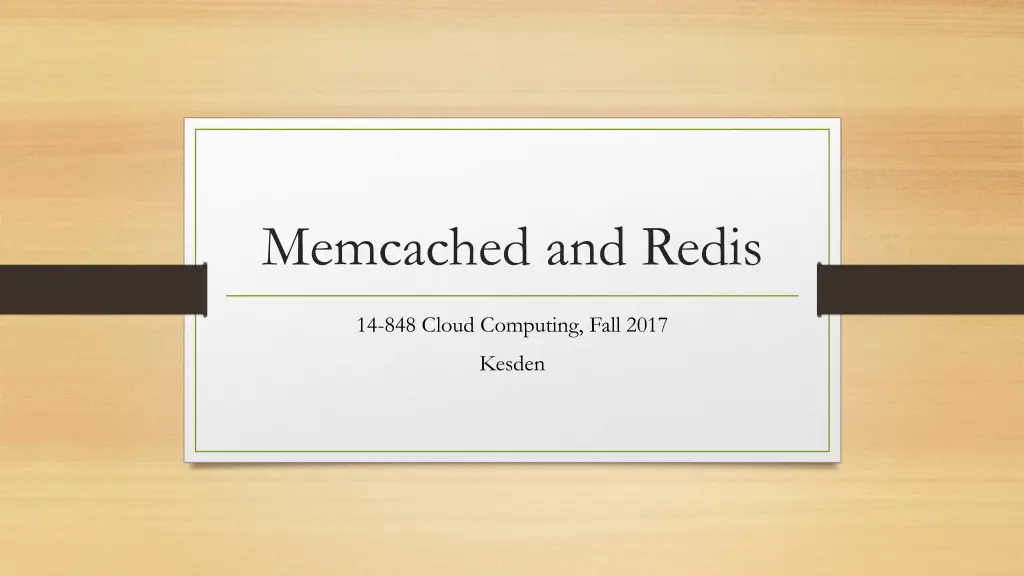
Memcached vs. Redis: Cloud Computing Solutions
Enhance your cloud computing knowledge by comparing Memcached and Redis for efficient data caching and retrieval. Learn about their architectures, features, and common use cases to optimize your systems and improve performance.
Uploaded on | 0 Views
Download Presentation

Please find below an Image/Link to download the presentation.
The content on the website is provided AS IS for your information and personal use only. It may not be sold, licensed, or shared on other websites without obtaining consent from the author. If you encounter any issues during the download, it is possible that the publisher has removed the file from their server.
You are allowed to download the files provided on this website for personal or commercial use, subject to the condition that they are used lawfully. All files are the property of their respective owners.
The content on the website is provided AS IS for your information and personal use only. It may not be sold, licensed, or shared on other websites without obtaining consent from the author.
E N D
Presentation Transcript
Memcached and Redis 14-848 Cloud Computing, Fall 2017 Kesden
Classic Problems Web servers query from disk Main memory is wasted Underlying databases queries can be redundant and slow Distributing load among Web servers partitions main memory Redundant memory cache, not larger memory cache Dedicated caching can often maintain whole, or large portions of, the working set, limiting the need to go to disk
Common Use of Memcached (But, dedicated servers are also common) https://memcached.org/about
Memcached Overview Distributed hashtable (Key-Value Store) Except that Forgetting is a feature When full LRU gets dumped Excellent for high-throughput servers Memory is much lower latency than disk Excellent for high-latency queries Caching results can prevent the need to repeat these big units of work
Memcached Architecture Servers maintain a key-value store Clients know about all servers Clients query server by key to get value Two hash functions Key--->Server Key-->Associative Array, within server All clients know everything.
Code, From Wikipedia function get_foo(int userid) { data=db_select("SELECT * FROM users WHERE userid = ?", userid); returndata; } function get_foo(int userid) { /* first try the cache */ data=memcached_fetch("userrow:" +userid); if (!data) { /* not found : request database */ data=db_select("SELECT * FROM users WHERE userid = ?", userid); /* then store in cache until next get */ memcached_add("userrow:" +userid, data); } returndata; }
Memcached: No replication Designed for volatile data Failure: Just go to disk Recovery: Just turn back on and wait Need redundancy? Build above memcached Just build multiple instances
REDIS REmote DIctionary SErver Like Memcached in that it provides a key value store But, much richer Lists of strings Sets of strings (collections of non-repeating unsorted elements) Sorted sets of strings (collections of non-repeating elements ordered by a floating-point number called score) Hash tables where keys and values are strings HyperLogLogs used for approximated set cardinality size estimation. (List from Wikipedia)
REDIS REmote DIctionary SErver Each data type has associated operations, e.g. get the one in particular position in a list, intersect sets, etc. Transaction support Configurable cache policy LRU-ish, Random, keep everything, etc.
REDIS: Persistence Periodic snapshotting to disk Append-only log to disk as data is updated Compressed in background Updates to disk every 2 seconds to balance performance and risk Single process, single thread
REDIS Clustering: Old School Old School Divide up yourself Clients hash Clients divide range Clients Interact with Proxy which does the same Hard to handle queries involving multiple keys
REDIS Clustering: New School REDIS Cluster Distribute REDIS across nodes Multiple key queries okay, so long as all keys in query in same slot Hash tags used to force keys into the same slot. this{foo}key and that{foo}key in the same slot Only {foo} is hashed
